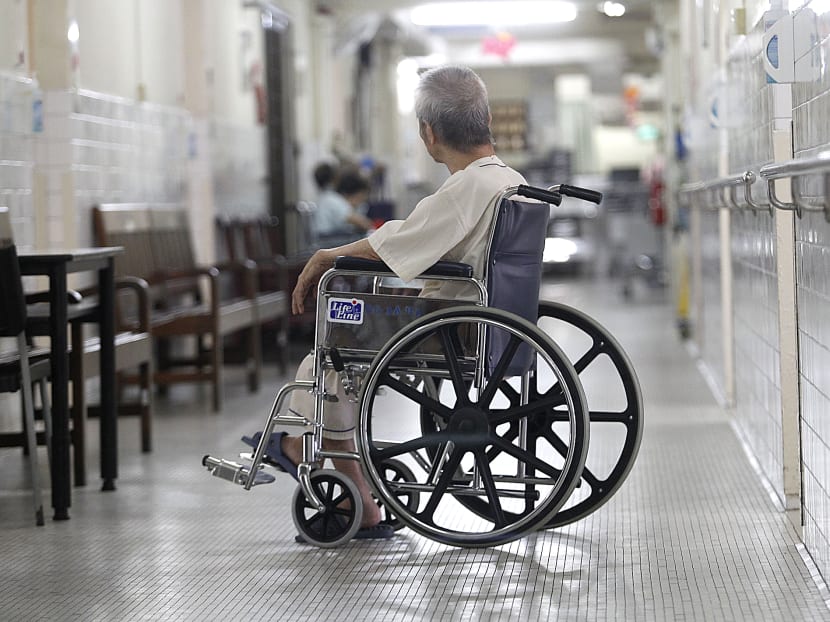Singaporeans living longer but spending more time in ill health: Study
SINGAPORE — Singaporeans may be the world’s longest-living people, but they are also living a slightly greater proportion of their lives in poor health compared with about 30 years ago.

The goal of increasing life expectancy while reducing time spent in poor health at the same time has not yet been achieved consistently by any country, a study found.
SINGAPORE — Singaporeans may be the world’s longest-living people, but they are also living a slightly greater proportion of their lives in poor health compared with about 30 years ago.
This is from a report that studied the burden of disease here between 1990 and 2017.
The report also found that non-fatal diseases for young Singaporeans from 10 to 34 years old in 2017 were largely driven by mental disorders.
Self-harm is found to be, disproportionately, the cause of premature death of young people.
The report put up last month on the Ministry of Health's website was done in collaboration with the United States-based Institute of Health Metrics and Evaluation.
It measured:
Years lost due to premature death, which is termed “years of life lost”
Years with health issues due to non-fatal causes of disease and injury, termed as “years lived with disability”
The sum of the two metrics above, which is “disability-adjusted life years”
Overall, Singaporeans are living healthier and longer, the report said.
Most of the improvement is due to reduction in years of life lost, which means the burden of early death has declined.
However, the rate of years lived with disability has been nearly constant since 1990, which means more time is spent with disability.
HOW MUCH LONGER ARE SINGAPOREANS LIVING?
Singaporeans are outliving the Japanese by about six months, the study found.
Life expectancy: 84.8 years in 2017 compared with 76.1 years in 1990, an increase of 8.7 years
Healthy life expectancy (which assesses quality of health): 74.2 years in 2017 compared with 67.1 years in 1990, an increase of 7.2 years
Singaporeans spent 10.6 years in ill health in 2017, about 1.5 years longer than they did in 1990
A person born in 2017 would live an estimated 12.5 per cent of his life in ill health, compared with 11.8 per cent for a person born in 1990
WHAT DOES IT MEAN?
More time is being spent in ill health across the population here.
The gains in the number of years expected to be spent in good health did not match gains in the number of years expected to be lived.
There are two key reasons why more years are spent in ill health.
One is because of an ageing population.
The other is because of the tendency for older people to have higher rates of chronic disease and disability than their younger counterparts.
Sign up for TODAY's news service. Choose your preferred delivery option:



WHAT ARE THE POLICY IMPLICATIONS?
There is a need to increase life expectancy while simultaneously cutting down the amount of time people spend in poor health.
This means further reducing the burden of disability and enhancing the abilities of its health system to care for its ageing population.
The report noted that the goal of increasing life expectancy while reducing time spent in poor health at the same time has not yet been achieved consistently by any country.
WHAT ARE THE CAUSES OF ILL HEALTH OR DEATH?
In 2017, non-communicable diseases were the largest contributors to the three metrics of years of life lost, years lived with disability, and disability-adjusted life years.
This is largely similar to 1990.
The top few types of illnesses that contribute to the three metrics were largely unchanged.
The top causes of disability-adjusted life years in 2017 were:
Cardiovascular diseases (14.2 per cent of total disability-adjusted life years)
Cancers (13.3 per cent)
Musculoskeletal disorders (12.6 per cent)
Mental disorders (10.2 per cent)
The burden of communicable diseases was highest among young people, but non-communicable diseases became the main driver as people entered late childhood, adolescence and adulthood.
Non-communicable diseases include:
Cardiovascular diseases
Respiratory diseases
Diabetes and kidney diseases
Mental disorders
Cancers
Musculoskeletal disorders
Communicable diseases include:
Maternal and neonatal disorders
Nutritional deficiencies
Respiratory infections and tuberculosis
The top causes of premature death (years of life lost) in 2017 were:
Cancer (31.8 per cent of total years of life lost)
Cardiovascular diseases (28.5 per cent)
Respiratory infections and tuberculosis (10.1 per cent)
Self-harm and interpersonal violence (5.6 per cent)
The top causes of health issues related to non-fatal diseases (years lived with disability) in 2017 were:
Musculoskeletal disorders (20.7 per cent of total years lived with disability)
Mental disorders (17.0 per cent)
Unintentional injuries (8.7 per cent)
Neurological disorders (7.7 per cent)
WHAT IS AILING THE YOUNG?
While self-harm and interpersonal violence make up only 5.6 per cent of total premature deaths for 2017, the study found that it disproportionately affected Singapore’s young adults.
It made up 32.9 per cent of total premature deaths for those aged between 20 and 24. In that age group, 30.9 per cent suffered premature deaths due to self-harm.
Mental disorders were also the largest driver of health issues related to non-fatal diseases (years lived with disability) for Singaporeans aged 10 to 34 in 2017, the study noted.
It spiked for those aged between 10 and 14, and between 15 and 19, making up 28.1 per cent and 30.4 per cent, respectively, of total years lived with disability.











